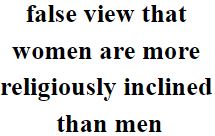“No Men in the Church.”
[by Prof. Friedrich Bente]
This complaint, which has been coming from almost all sectarian churches for years, was also addressed by a speaker at the recent Episcopal Methodist Convention in St. Louis. The churches, he said, have become essentially women's churches. The preacher, he said, is reproached by men when he exhorts them to attend church: “You are running a woman's church.” Like Roman priests before them, Protestant preachers now have lost their hold on men, he said. On average, there is not one man for every three women in the church. Preachers who succeed in attracting men are rare birds. Year in, year out, preaching is done almost exclusively to women and children. The same is true of the prayer meeting, which is also composed almost exclusively of women. And in his pastoral work, the preacher also used to limit himself to women and children. The men and young men, however, usually left the church and became agnostics. Indeed, people had become so accustomed to this state of affairs that the preachers were no longer surprised by it. But all this makes one think. How to bring men into the church is the most important problem that the church of today has to solve.
As the causes of this sad phenomenon were mentioned: Business, which takes up too much of the men's time, Sunday newspapers, saloons, the decay of home worship, the proliferation of clubs, lodges, and theaters, and the false view that women are more religiously inclined than men. The two main reasons, however, why men and young men turn their backs on the sect churches [Reformed] were not recognized and mentioned. These are obviously the religionless, pagan education of the youth in the state schools and the secular, pagan sermons in the sect churches.
The only means that can lead to the church and keep one in the church is God's Word: Law and Gospel. But God's Word is not used at all in the schools used by the sects and is rarely used in the sect churches. But how can a preacher expect men to be interested in a political sermon, for example, in the long run? And how can secular sermons strike the conscience and awaken the sense of duty with regard to church attendance? Of preachers who take their text from Paul and their sermon from the newspaper, Daniel Webster is reported to have once said, “If a preacher does that, I prefer to enjoy my own thoughts. What I want from my pastor is for him to tell me: ‘You are mortal; you have a short probation; your work must be done soon; you hasten before God's judgment seat.’ So when I am addressed, I have no inclination to dream or sleep.” It is also a fact that the women in the sect churches are attracted and kept less by the sermons than by the church kitchen, church concerts and clubs. [!] What the men seek in clubs and lodges, the women in the sects often seek in the churches: Conviviality.
- - - - - - - - - - - - Concluded in the next Part 6b - - - - - - - - - - - -
Perhaps Bente has caused the reader to catch their breath with his "plain talk"… The rest of this essay in Part 6b.

blurred,%20cropped.jpg)


No comments:
Post a Comment
Comments only accepted when directly related to the post.